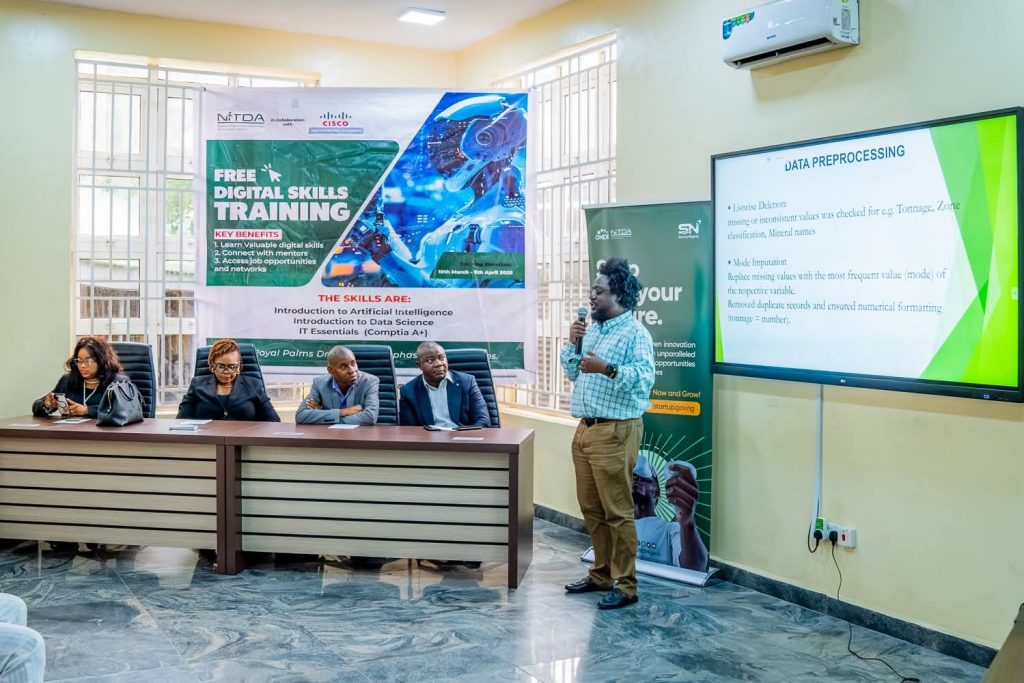Technology
DL4ALL: NITDA, CISCO EMPOWER YOUTH WITH DIGITAL SKILLS
DL4ALL: NITDA, CISCO EMPOWER YOUTH WITH DIGITAL SKILLS
AJAGBE ADEYEMI TESLIM
SPONSORED BY: H&H
Fifty selected young unemployed Nigerians have completed a four-week intensive digital skills bootcamp under the Digital Literacy for All (DL4ALL) initiative, gaining practical training in Data Science, Artificial Intelligence (AI), and IT Essentials.

The programme, a collaborative effort between the National Information Technology Development Agency (NITDA) and Cisco, was hosted at NITDA’s South West Zonal Office in Victoria Island, Lagos.
Speaking on behalf of the Director General of NITDA, Kashifu Inuwa , the Head of the South West Zonal Office, Mrs. Chioma Okee-Agugwo, described the initiative as a vital component of Nigeria’s digital future.
“This is not just a closing ceremony. It is the launchpad for new journeys—anchored in digital knowledge and powered by innovation,” she remarked.

According to the Director General, the initiative is rooted in NITDA’s Strategic Roadmap and Action Plan (SRAP 2.0) and reflects key focus areas including Digital Literacy, Emerging Technologies, and Youth Empowerment. It also aligns with President Bola Ahmed Tinubu’s Renewed Hope Agenda, which seeks to accelerate economic diversification through digitisation, innovation, and skills development.

Inuwa noted that the DL4ALL initiative forms part of Nigeria’s broader commitment to digital inclusion—ensuring that no one is left behind in the evolving digital economy.
It also supports the ambitious goal of achieving 70% digital literacy by 2027, championed by the Honourable Minister of Communications, Innovation and Digital Economy, Dr. Bosun Tijani.
This national vision aims to equip millions of Nigerians with the skills required to thrive in a tech-driven world.
He further emphasized the importance of empowering youth with globally relevant skills. “They are no longer just consumers of technology. They are creators, innovators, and future employers,” he said.

The NITDA boss explained that throughout the bootcamp, participants engaged in hands-on learning experiences designed to build both technical proficiency and digital leadership capabilities.
“This is only the beginning,” he stated. “Through our zonal strategy, we are bringing innovation closer to local communities. This is how we democratise access and unlock Nigeria’s full digital potential.”
Inuwa expressed appreciation to Cisco for delivering high-impact training and called on stakeholders to continue investing in partnerships, people, and platforms that drive digital inclusion.
He asserted that the newly certified participants are now equipped to contribute meaningfully to Nigeria’s digital economy—armed with the skills to build solutions, secure infrastructure, and launch tech ventures that solve real-world problems.
At the end of the bootcamp, participants demonstrated their knowledge through impressive presentations that showcased the integration of skills acquired across Data Science, AI, and IT Essentials. Many spoke passionately about how the programme had expanded their technical competence and sparked a drive to create job opportunities—not only for themselves but also for others—as entrepreneurs and digital solution providers in their communities.
